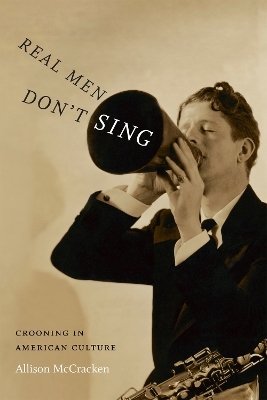
Real Men Don't Sing
Crooning in American Culture
Seiten
2015
Duke University Press (Verlag)
978-0-8223-5917-3 (ISBN)
Duke University Press (Verlag)
978-0-8223-5917-3 (ISBN)
Allison McCracken charts the rise and fall of crooners between 1925 and 1934, showing how the backlash against crooners' perceived sexual and gender deviance created stylistically masculine norms for white male pop singers that continue to exist today.
The crooner Rudy Vallée's soft, intimate, and sensual vocal delivery simultaneously captivated millions of adoring fans and drew harsh criticism from those threatened by his sensitive masculinity. Although Vallée and other crooners reflected the gender fluidity of late-1920s popular culture, their challenge to the Depression era's more conservative masculine norms led cultural authorities to stigmatize them as gender and sexual deviants. In Real Men Don't Sing Allison McCracken outlines crooning's history from its origins in minstrelsy through its development as the microphone sound most associated with white recording artists, band singers, and radio stars. She charts early crooners’ rise and fall between 1925 and 1934, contrasting Rudy Vallée with Bing Crosby to demonstrate how attempts to contain crooners created and dictated standards of white masculinity for male singers. Unlike Vallée, Crosby survived the crooner backlash by adapting his voice and persona to adhere to white middle-class masculine norms. The effects of these norms are felt to this day, as critics continue to question the masculinity of youthful, romantic white male singers. Crooners, McCracken shows, not only were the first pop stars: their short-lived yet massive popularity fundamentally changed American culture.
The crooner Rudy Vallée's soft, intimate, and sensual vocal delivery simultaneously captivated millions of adoring fans and drew harsh criticism from those threatened by his sensitive masculinity. Although Vallée and other crooners reflected the gender fluidity of late-1920s popular culture, their challenge to the Depression era's more conservative masculine norms led cultural authorities to stigmatize them as gender and sexual deviants. In Real Men Don't Sing Allison McCracken outlines crooning's history from its origins in minstrelsy through its development as the microphone sound most associated with white recording artists, band singers, and radio stars. She charts early crooners’ rise and fall between 1925 and 1934, contrasting Rudy Vallée with Bing Crosby to demonstrate how attempts to contain crooners created and dictated standards of white masculinity for male singers. Unlike Vallée, Crosby survived the crooner backlash by adapting his voice and persona to adhere to white middle-class masculine norms. The effects of these norms are felt to this day, as critics continue to question the masculinity of youthful, romantic white male singers. Crooners, McCracken shows, not only were the first pop stars: their short-lived yet massive popularity fundamentally changed American culture.
Allison McCracken is Associate Professor of American Studies at DePaul University.
Acknowledgments ix
Introduction 1
1. Putting Over a Song: Crooning, Performance, and Audience in the Acoustic Era, 1880–1920 37
2. Crooning Goes Electric: Microphone Crooning and the Invention of the Intimate Singing Aesthetic, 1921–1928 74
3. Falling in Love with a Voice: Rudy Vallée and His First Radio Fans, 1928 126
4. "The Mouth of the Machine": The Creation of the Crooning Idol, 1929 160
5. "A Supine Sinking into the Primeval Ooze": Crooning and Its Discontents, 1929–1933 208
6. "The Kind of Natural That Worked": The Crooner Redefined, 1932–1934 (and Beyond) 264
Conclusion 311
Notes 333
Bibliography 375
Index 411
| Erscheint lt. Verlag | 25.9.2015 |
|---|---|
| Reihe/Serie | Refiguring American Music |
| Zusatzinfo | 80 illustrations |
| Verlagsort | North Carolina |
| Sprache | englisch |
| Maße | 152 x 229 mm |
| Gewicht | 771 g |
| Themenwelt | Kunst / Musik / Theater ► Musik ► Klassik / Oper / Musical |
| Kunst / Musik / Theater ► Musik ► Musikgeschichte | |
| Kunst / Musik / Theater ► Musik ► Pop / Rock | |
| Sozialwissenschaften ► Soziologie ► Gender Studies | |
| ISBN-10 | 0-8223-5917-0 / 0822359170 |
| ISBN-13 | 978-0-8223-5917-3 / 9780822359173 |
| Zustand | Neuware |
| Informationen gemäß Produktsicherheitsverordnung (GPSR) | |
| Haben Sie eine Frage zum Produkt? |
Mehr entdecken
aus dem Bereich
aus dem Bereich
Mozart und der Abschied von der Aufklärung
Buch | Hardcover (2024)
C.H.Beck (Verlag)
28,00 €


